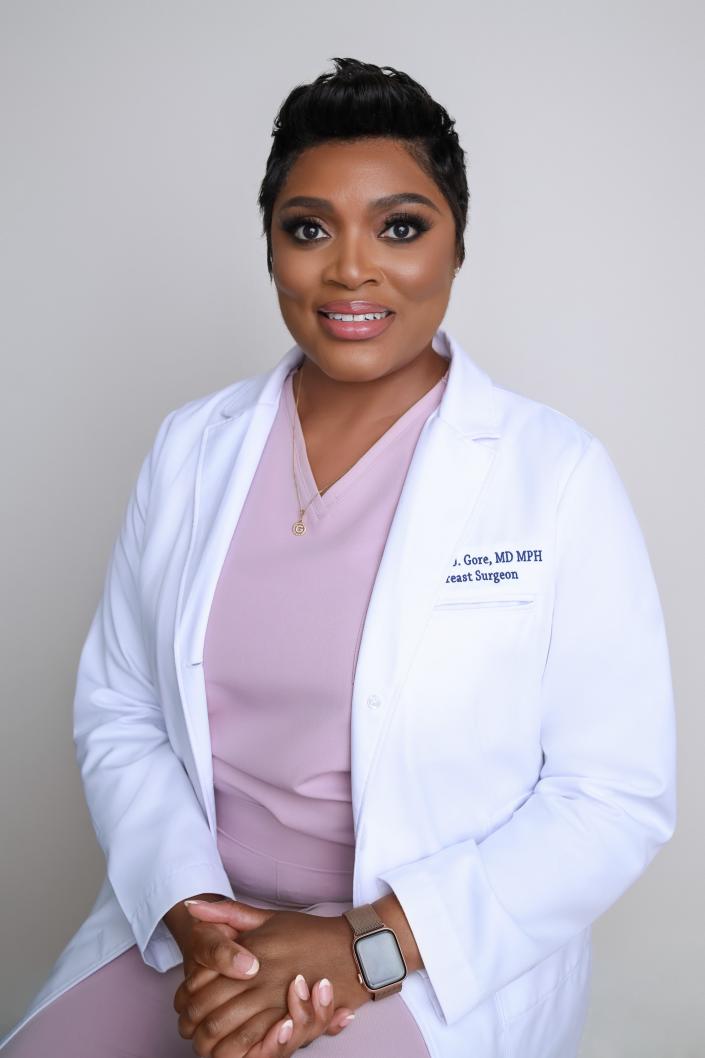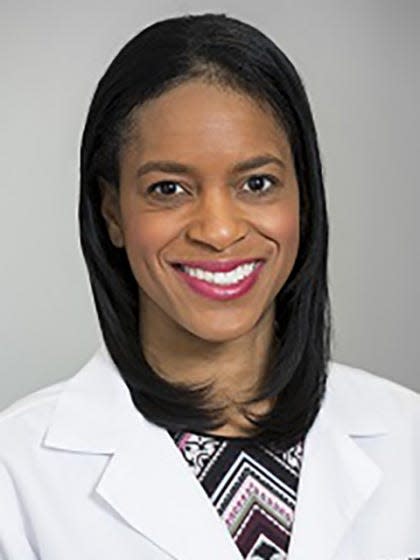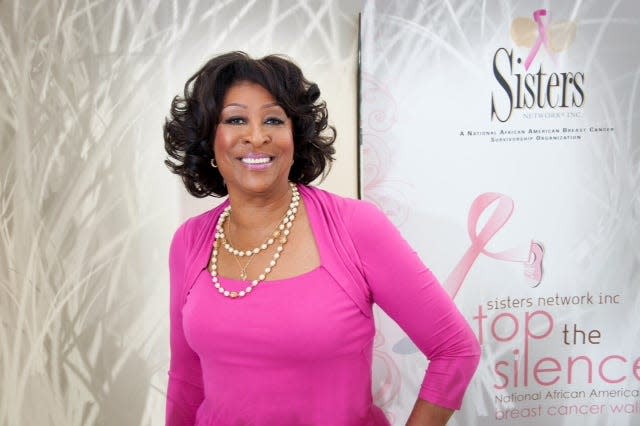More and more, Dr. Ryland Gore has been diagnosing Black women with breast cancer at younger ages.
Black women are more likely to be diagnosed with aggressive, fast-growing breast cancer subtypes. The Atlanta-based breast surgical oncologist said that by the time many of her patients reach her, the cancer is advanced.
She worries for her patients and wishes national guidelines would recommend those at high risk like Black women get screened at younger ages.
“When you have these women coming in their 30s – 30, 33, 34 – consistently, over and over and over and over again, it’s not a one-off anymore. Something has to be done,” she said.
A recent study assessing breast cancer mortality rates among 415,000 U.S. women suggests Black women should get screened at age 42 when the recommended age is 50 for the general female population.
The researchers calculated that Black women died in their 40s at a rate of 27 deaths per 100,000 patients – far higher than the rate of white women who died in their 40s at 15 deaths per 100,000.
More: ‘A national emergency’: Black women still 40% more likely to die of breast cancer than white women

“The current one-size-fits-all policy to screen the entire female population from a certain age may be neither fair and equitable nor optimal,” wrote the authors of the analysis, published in JAMA Network Open.
The study has causeda stir among health equity advocates. While many say it’s opening the discussion for earlier screening, some experts and survivors say Black women should be screened even earlier – at age 40 or younger. They want to see a unified approach developed and updates to official guidelines.
“It’s time for a different discussion,” Gore said. “Why would we wait until the 11th hour knowing that certain groups are at high risk when we can completely change the course of that woman’s life?”
There is currently no national consensus about breast cancer screening before age 50, and age recommendations vary from group to group.
Story continues
The U.S. Preventive Services Task Force – an independent panel of experts that typically sets national recommendations – is reviewing its guidelines, which were last updated in 2016. Those state women ages 50 to 74 get screened for breast cancer every other year. Those in their 40s who are concerned should make an individual decision with their clinician.
“Each year, too many women are faced with the challenge of dealing with breast cancer. We all want better screening, better treatments, and better ways to prevent this devastating disease,” task force chair Dr. Michael Barry said in a statement to USA TODAY. “Recognizing that Black women are more likely to die from breast cancer than others, we are particularly interested in understanding what the research shows about how best to help address this disparity.”
Meanwhile, the American College of Radiology suggests all women get annual screenings starting age 40, and high-risk groups like Black women get risk assessments no later than age 30.

More: ‘We still are dying at alarming rates’: Black cancer death rates are falling but remain higher than others, study finds
Similarly, the American Cancer Society says that women should start screening at age 45 but that they should have the option to begin screening at 40.
Dr. Vivian Bea, section chief of breast surgical oncology at NewYork-Presbyterian Brooklyn Methodist Hospital and breast surgeon at Weill Cornell Medicine, said there needs to be a unified approach.
“It’s confusing for physicians and providers who are then counseling patients,” she said. “It’s also confusing for patients.”
She added that primary care physicians, who are essential because many patients lack specialist access, tell her they have trouble getting insurance companies to approve a mammogram or ultrasound for younger Black patients.
They “oftentimes have to fight with insurance companies to get a screening mammogram for their patients,” she said. “We have put primary care physicians in a space where their hands are tied … they’re unable to do what may be the right thing because of guidelines that have been set and determined.”
More: Black women are missing from breast cancer tumor data. And that may be killing them
Studies have shown Black breast cancer patients are diagnosed more often before age 40 than their white counterparts. According to the latest analysis from the American Cancer Society, of all racial groups Black women made up the most cases among those diagnosed before age 40. Another analysis, dating back to 2002, found more than 10% of Black women with breast cancer were diagnosed before age 40 compared with 5% of white women.
“It should really light fire under us all to be advocates and to really be a voice for those patients who are disproportionately affected by the current recommendations by the U.S. task force,” Bea said.
Robert Smith is a cancer epidemiologist and senior vice president of early cancer detection for the American Cancer Society, which he said is reviewing its guidelines form 2015.
“We’ll be looking at issues in which different recommended age for screening might be appropriate for different subgroups of the population,” he said. Those risk factors include family history, race and ethnicity.
More: This group of young women is seeing a staggering rise in uterine cancer. Experts don’t know why.

Karen Jackson, a four-time breast cancer survivor, said she would have benefited from earlier screening. She was first diagnosed at 48. Initially, a mammogram missed the tumor – but knowing her family history, Jackson demanded an ultrasound, which picked up the mass.
Her doctor said the slow-growing, 3.5-centimeter mass probably had been there for years − six or longer.
“I was living with something that you couldn’t feel with your hands,” she said. “The ultrasound saved my life.”
Just a few months after she was diagnosed three decades ago, Jackson started the national Black survivorship organization Sisters Network. Reflecting on the screening guidelines, she recalled members who have since died.
“I’m talking about women who were alive – and now they’re dead. The guidelines didn’t work for them,” she said. “We were able to see early on that we were dying before age 40.”
Bea said she appreciates that the study highlights “the point that we really have to do better. We have to have to come up with better recommendations based on age, race and ethnicity.”
But “42 is absolutely not good enough.”
Reach Nada Hassanein at [email protected] or on Twitter @nhassanein.
This article originally appeared on USA TODAY: Breast cancer screening at 42? Study says Black women should.